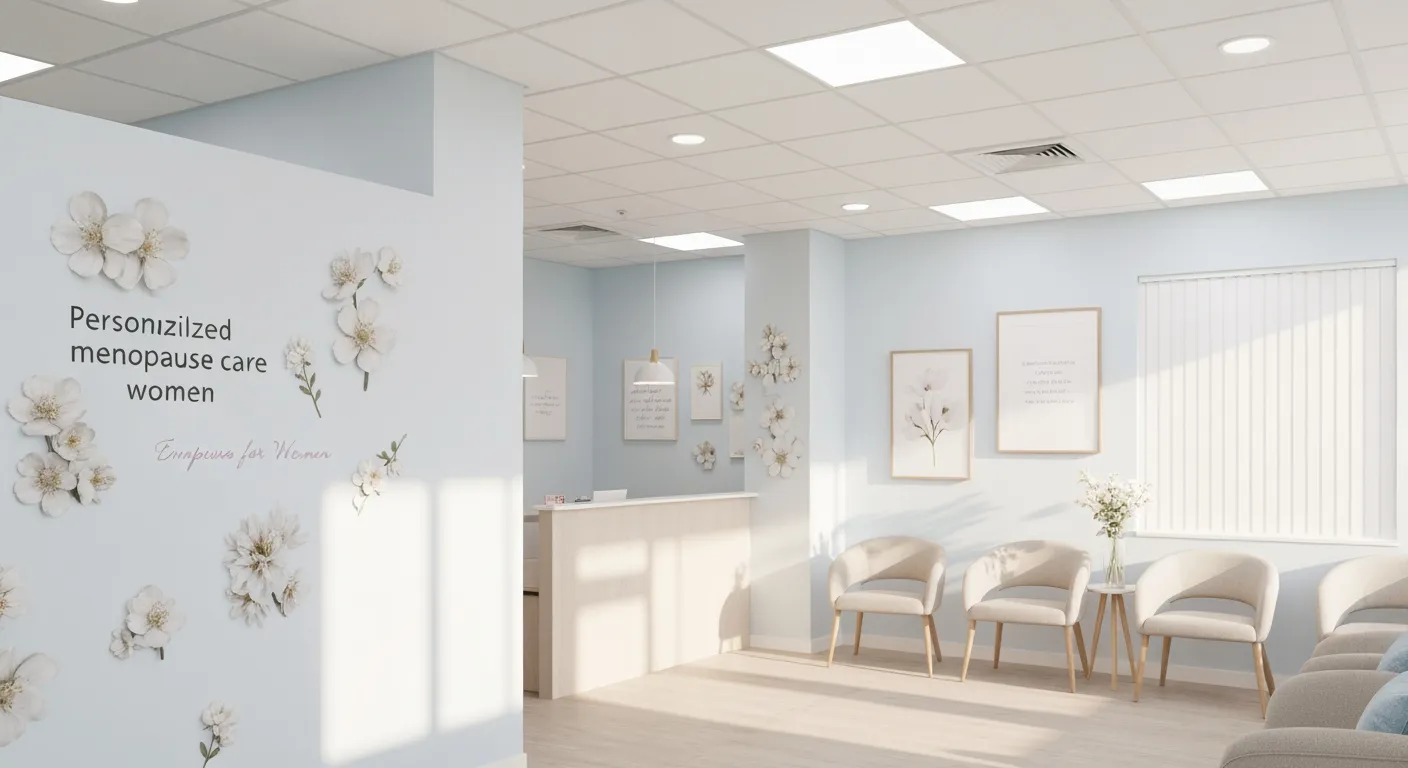Empowering Choices: The Essentials of Birth Control Counseling

Understanding Menopause and Its Impact
What is Menopause?
Menopause marks the natural end of menstrual cycles when a woman has gone 12 months without a period. This typically happens around age 51 but can range from 45 to 55 years. The transition, called perimenopause, usually lasts several years and involves fluctuating hormone levels.
Common Symptoms
Women often experience hot flashes, night sweats, mood changes, sleep disturbances, vaginal dryness, and memory or concentration issues. These can vary from mild to severe and impact daily life.
Health Risks After Menopause
Lower estrogen levels increase the risk of osteoporosis (bone thinning), cardiovascular disease, urinary issues, and vaginal atrophy. Bone density loss accelerates, making fractures more likely, especially in the spine, wrists, and hips.
Lifestyle's Role in Managing Menopause
A healthy diet rich in calcium and vitamin D supports bone health. Regular exercise—especially weight-bearing and resistance training—helps maintain muscle mass and bone strength. Relaxation techniques, good sleep habits, and avoiding smoking or excessive alcohol can ease symptoms like hot flashes and mood swings. Personalized lifestyle changes and professional guidance are crucial for improving quality of life during menopause.
Lifestyle Modifications to Manage Menopausal Symptoms Effectively

What are key lifestyle changes that help manage menopause?
Managing menopause effectively involves several lifestyle modifications that support both physical and mental health.
Diet plays a crucial role; adopting a Mediterranean diet for menopause rich in vegetables, fruits, whole grains, healthy fats, fish, and nuts can promote heart and bone health during menopause. This diet helps reduce inflammation and supports overall well-being.
Exercise is essential, particularly weight-bearing exercises and resistance activities like walking, running, dancing, and strength training. These help maintain bone density, reduce the frequency and severity of hot flashes, and improve mood and sleep quality.
Stress reduction techniques such as yoga, tai chi, meditation, and cognitive behavioral therapy (CBT) are beneficial. They help manage mood swings, anxiety, and improve sleep, contributing positively to mental well-being.
Environmental and behavioral adjustments can significantly alleviate vasomotor symptoms like hot flashes and night sweats. Women are encouraged to avoid triggers including spicy foods, caffeine, alcohol, and smoking. Wearing light clothing, keeping the bedroom cool, and using fans or cold drinks are practical strategies to reduce discomfort, as explained in managing hot flush triggers.
By integrating these approaches, women can experience improved comfort and quality of life during menopause while supporting long-term health.
Bone Health Preservation Through Diet and Exercise During Menopause

How can lifestyle support bone health during menopause?
As women enter menopause, the decrease in estrogen accelerates bone loss, increasing the risk of osteoporosis and fractures. Lifestyle plays a crucial role in counteracting these changes.
Adequate calcium intake is foundational for bone strength. Calcium-rich foods such as milk, yogurt, kale, salmon, almonds, and fortified products provide the necessary nutrients to support bone health during this period.
Vitamin D is essential to help the body absorb calcium effectively. Regular exposure to sunlight enables natural vitamin D production. When sun exposure is limited, vitamin D supplements become an important alternative to maintain optimal levels.
Exercise contributes significantly to preserving bone density. Weight-bearing activities like brisk walking, running, dancing, and resistance exercises such as strength training stimulate bone formation and reduce osteoporosis risk. These exercises also enhance muscle strength, improving balance and reducing fall risk.
Collectively, these lifestyle strategies — a diet rich in calcium and vitamin D, adequate sunlight or supplementation, combined with regular weight-bearing and resistance exercise — form a comprehensive approach to maintaining bone health during menopause.
Managing Menopausal Symptoms Through Personalized Healthcare Approaches

Hormone Replacement Therapy (HRT) Benefits and Risks
Hormone replacement therapy (HRT) is widely recognized as the most effective treatment for alleviating menopausal symptoms such as hot flashes, night sweats, and vaginal dryness. It works by supplementing decreased estrogen levels, improving quality of life, and reducing osteoporosis risk. However, HRT carries some risks, including potential breast cancer and thromboembolism, which largely depend on the dose and duration. Tailoring HRT by considering individual health profiles—such as age, cardiovascular risk, and history of hormone-sensitive conditions—is essential to maximize benefits and minimize adverse effects (Menopause and hormone therapy risks).
Nonhormonal Medication Options
For women who cannot or prefer not to use hormone therapy, several nonhormonal treatments are available. Selective serotonin reuptake inhibitors (SSRIs) like paroxetine and escitalopram, as well as gabapentin, have been shown to relieve vasomotor symptoms such as hot flashes effectively (Managing menopause symptoms). These medications serve as important alternatives, especially for those with contraindications to HRT. Additionally, over-the-counter vaginal lubricants help manage vaginal dryness, improving comfort and sexual health (Vaginal dryness treatments.
Cognitive Behavioral Therapy and Mental Health Support
Menopause often brings mood changes, anxiety, and sleep disturbances. Cognitive behavioral therapy (CBT) is an evidence-based nonpharmacologic treatment that effectively reduces the impact of hot flashes and improves sleep and emotional wellbeing. Other supportive approaches include relaxation techniques like yoga and mindfulness, which contribute to managing anxiety and enhancing mental health during this transition (Relaxation techniques for menopause.
Importance of Individualized Treatment Plans in Menopause Care
Personalized healthcare in obstetrics and gynecology plays a crucial role in improving women's outcomes during menopause. Early detection and customized treatment plans ensure that therapies such as HRT or nonhormonal options are aligned with each woman's symptom severity, health risks, and preferences (Personalized menopause treatment. This individualized approach enhances symptom management, reduces long-term complications, and supports overall wellbeing. Women are encouraged to engage with their healthcare providers to tailor their menopause care effectively based on their unique needs and lifestyle (Menopause care at NewYork-Presbyterian).
Comprehensive Services Offered by Woman-Led Healthcare Providers in Queens
What are the key services offered by a woman-led healthcare provider specializing in comprehensive obstetrics and gynecology?
Women-led healthcare providers in Queens deliver a broad spectrum of obstetrics and gynecology services, ensuring personalized and holistic care for women at every life stage. These providers offer routine gynecological exams and preventive screenings, prenatal and postnatal care—including monitoring of high-risk pregnancies—and expert support through the full maternity journey.
Advanced diagnostic tools such as 3D and 4D ultrasounds, colposcopy procedures, and endometrial biopsies allow for precise evaluations and early detection of gynecologic conditions. Minimally invasive gynecological surgeries, including laparoscopic and hysteroscopic procedures, reduce recovery time and improve outcomes. Cosmetic gynecological treatments further enhance women’s well-being and confidence.
Menopause management is a key service area, featuring personalized hormone replacement therapies, support for bone health and osteoporosis prevention, and mental health counseling to address mood changes and sleep disturbances. Moreover, providers focus on lifestyle support and wellness education, including nutrition, exercise, and stress management tailored to each woman’s needs.
This supportive, woman-centered environment fosters comprehensive care by addressing physical, emotional, and reproductive health holistically, empowering women in Queens to achieve optimal health and well-being throughout their lives.
The Role of Mental Well-being and Social Support in Menopause Management

Impact of menopause on mood and mental health
Menopause can significantly affect mood and mental well-being, with many women experiencing mood swings, anxiety, depression, and sleep disturbances. These changes are often linked to fluctuating hormone levels and the challenges of adjusting to a new life stage. For more on menopause mental health and emotional changes during menopause, see Managing Menopause and Mental wellbeing and menopause.
Benefits of therapy and mindfulness
Therapies such as cognitive behavioral therapy (CBT) have been shown to reduce hot flashes and improve sleep quality, which in turn helps manage anxiety and depressive symptoms. Mindfulness practices, including yoga, tai chi, and meditation, promote relaxation and emotional balance, offering practical tools to ease menopause-related mental health struggles. Additional information on Cognitive behavioral therapy for menopausal symptoms and mind-body therapies for menopause is available.
Importance of social connections and support groups
Connecting with others who are also experiencing menopause provides invaluable emotional support. Sharing experiences through support groups or informal conversations with family and friends fosters understanding and reduces feelings of isolation, helping women feel more empowered. See Emotional support during menopause and Menopause mental health for details.
Lifestyle strategies to reduce anxiety and depression
Incorporating regular exercise, establishing consistent sleep routines, and engaging in relaxation activities are effective lifestyle strategies. These habits not only improve mental health but also contribute positively to physical symptoms of menopause. Explore more about lifestyle changes for menopause and stress reduction for menopause.
Personalized care approaches in obstetrics and gynecology enhance outcomes by integrating mental health support alongside physical symptom management. This holistic strategy acknowledges the complex interplay between mind and body during menopause, helping women maintain a higher quality of life during this transition. Learn about personalized menopause care and comprehensive women's midlife care.
Taking Control of Menopause with Lifestyle and Healthcare Support
Lifestyle Strategies for Managing Menopause
Adopting healthy habits can significantly ease menopause symptoms and improve overall well-being. A balanced diet rich in calcium and vitamin D supports bone health, while regular weight-bearing and strength exercises help maintain muscle mass and protect against osteoporosis. Avoiding smoking and limiting alcohol are vital, alongside relaxation practices like yoga and meditation to reduce mood swings and stress. Cooling techniques and avoiding triggers such as spicy foods and caffeine help manage hot flashes.
Personalized Healthcare and Regular Screenings
Individualized care from healthcare providers, including hormone therapy options when appropriate, is crucial for effective menopause management. Regular screenings for bone density, cardiovascular health, and cancer early detection allow for timely interventions. Mental health support and therapies like cognitive behavioral therapy can address mood and sleep disturbances.
Proactive Symptom Management and Support
Women are encouraged to actively track symptoms and seek support, whether through medical consultation or peer groups. Personalized treatment plans that combine lifestyle adjustments and medical therapies offer optimal relief. Open communication and professional guidance empower women to navigate menopause confidently and maintain their health and quality of life.





.png)